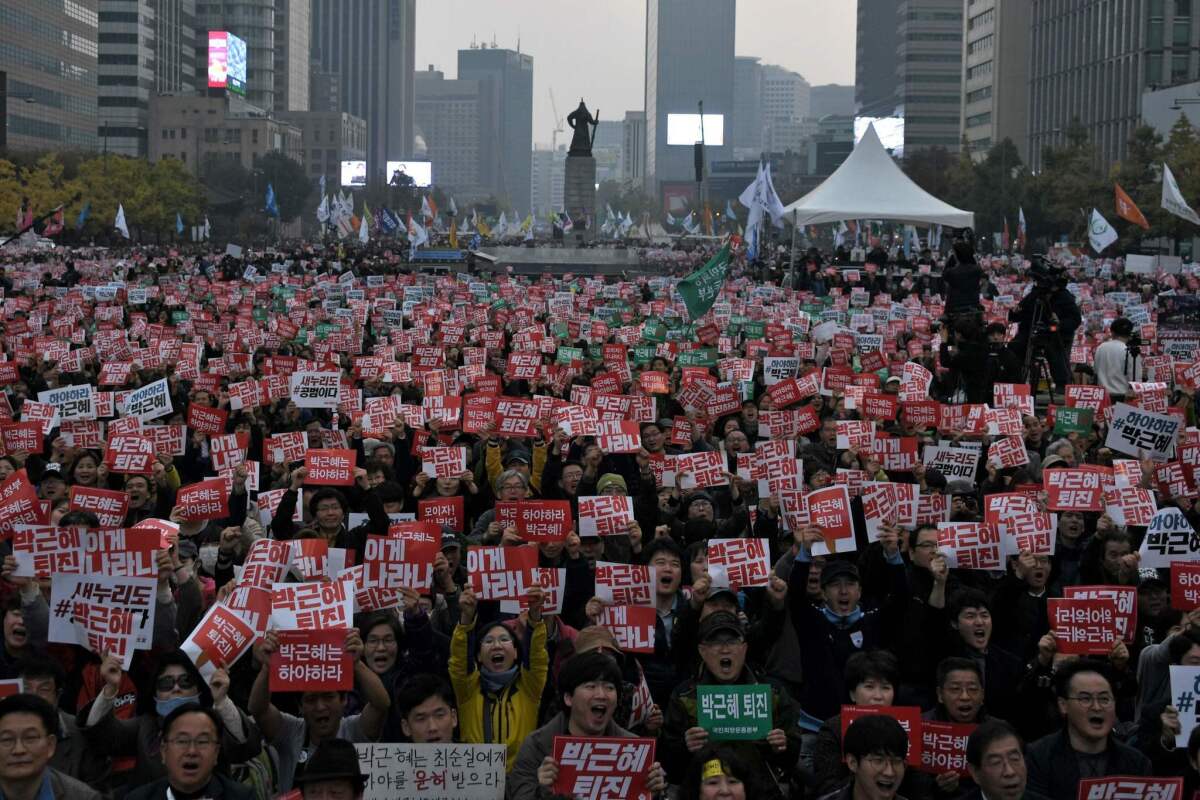South Korea finally has its first female president, but women’s groups fear she’s only made sexism worse

- Share via
Reporting from SEOUL — When Park Geun-hye became South Korea’s first female president in 2013, women’s groups saw it as little more than a superficial milestone.
They had protested her candidacy, arguing that the daughter of a dictator would never represent real women.
Now, with Park facing calls to resign over an influence-peddling scandal, women’s rights supporters fear her presidency has only deepened sexism and misogyny here.
“Sadly, the failure of President Park Geun-hye is generating hatred against the female sex,” said Nam In-soon, who chairs the Gender Equality and Family Committee in parliament.
Gender inequality is deeply entrenched in South Korea.
Women on average earn 37% less than men, the biggest gap among the 35 countries in the Organization for Economic Cooperation and Development. At the country’s 10 biggest companies, women hold 2% of management positions, according to the market research firm CEOScore.
Women make up 17% of the elected members of parliament, well below average for Asia and the world’s developed countries.
Experts trace that statistic to social conditions and a lack of female role models in politics. Han Myeong-sook, a woman who became prime minister in 2006 and served for 11 months, eventually went to jail for corruption, while Park Young-sun, who became the first female floor leader in parliament in 2014, soon quit amid political strife.
Park, the daughter of Park Chung-hee, who led South Korea from 1961 until his assassination in 1979, chaired the conservative Grand National Party — the predecessor to the ruling Saenuri Party — before running for president. She lost in her first attempt, then won five years later.
It was a historic moment for women in South Korea. But whether Park really broke the glass ceiling has been a topic of debate here, centering on whether she ever represented women’s interests.
She ran on nostalgia for her father, who is largely credited for modernizing the economy through industrialization and is highly regarded by many old people in rural areas. They remember Park in the presidential Blue House, where she acted as first lady in her twenties after her mother was assassinated.
Her presidential campaign never pandered to women’s rights organizations, which fought against her father’s dictatorship and solidly opposed her candidacy.
While she promised affordable child care, paternity leave and more job centers for women, those positions were not radically different from the platforms of her male rivals.
In office, she has done little to promote women in government. Just two of her 19 ministers are women.
“Women’s activists generally have few positive things to say about her and certainly did not expect much change in the position of women in Korean politics and society,” said Heike Hermanns, a political scientist at Gyeongsang National University. “Park Geun-hye is thus rather an outlier than a sign of progress for women in politics.”
Hermanns said the established power structures, in which personal networks play a major role, make it difficult for women to obtain higher positions.
“As long as Korean politics remains personalized and relies on outsiders as party saviors, men will dominate as there are so few women who are in such a position,” she said.
Experts say the current scandal, in which her longtime friend Choi Soon-sil stands accused of using her influence with the president to extort money from businesses, has damaged women’s position in politics and society.
“This situation was actually predictable from the moment she was elected president,” Nam said. “If she got on well, it would probably have been assessed that it was because she is the daughter of Park Chung-hee. And if she failed — just like she did now — we knew that it would strengthen the voice of discrimination against women.”
Conservative media have criticized Choi for “unladylike” toughness, luxury tastes and her relationship with Ko Young-tae, her alleged “boy toy” and slush fund assistant.
As the 2017 presidential election nears, the country has few women who would stand much chance of being elected. Shim Sang-jung and former presidential contender Lee Jung-hee, both parliamentary leaders of minor liberal parties, are considered too radical to be taken seriously.
One exception is Choo Mi-ae, the popular chairwoman of the main opposition party, who has defied many of the country’s political and social norms, marrying a man with a disability and working with former President Kim Dae-jung despite being from a rival region.
Ramirez is a special correspondent.
MORE WORLD NEWS
Here’s what might happen in the Middle East under a Trump presidency
More to Read
Sign up for Essential California
The most important California stories and recommendations in your inbox every morning.
You may occasionally receive promotional content from the Los Angeles Times.












